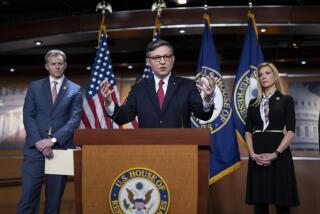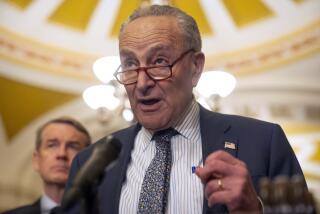Obama adopts arm’s-length strategy on government shutdown
WASHINGTON — In 2011, with the government dangling on the edge of default, President Obama and House Speaker John A. Boehner (R-Ohio) engaged in near daily negotiations. There were regular phone calls, talks and red wine at the White House. There were blowups, makeups and then a deal.
Now, two years later, Obama isn’t even convening the first White House meeting with congressional leaders until Wednesday evening, more than 40 hours after the deadlock in Congress forced a government shutdown. And the meeting is expected to be little more than a photo-op.
The shift from the hands-on to the arm’s-length strategy is at the core of the White House plans for handling the current crisis. As he deals with a standoff that could scramble the politics of his second term, Obama has adopted a new approach to Congress.
FULL COVERAGE: The U.S. government shutdown
He is keeping his distance.
That has been deliberate change, though one made easier by the nature of the budget stalemate. Republicans are divided over the tactics that led to the first government shutdown in 17 years. Boehner may technically be driving, but tea party conservatives are the GPS giving directions.
That has allowed White House officials to argue that they have no one on the Hill with whom to negotiate. Wading into the mud without an empowered negotiating partner would just leave the president muddied, according to a senior administration official, speaking anonymously to discuss strategy.
Keeping the president’s hands clean comes with risks. Republicans are casting Obama as a leader who has shirked his role. “Though a prolific speechmaker, POTUS has failed his most basic obligation to participate in the process of governing our nation,” Rep. Darrell Issa (R-Vista) tweeted Wednesday.
House members posed for the media Tuesday seated at a negotiating table facing empty chairs.
The White House appeared ready to answer that photo op with one of its own. Obama invited the four top congressional leaders to visit on Wednesday afternoon, but a senior administration official said the president doesn’t view the get-together as a negotiation.
“We’re not asking for concessions,” the official said. “We’re asking them to do their jobs. They’re the only ones asking for concessions.” At that session, Obama plans to repeat what he has said in public: The way to reopen the government is for the House to pass a bill that extends funding at current levels without any amendments that undermine the Affordable Care Act, more commonly known as Obamacare.
Republicans greeted the meeting with skepticism.
“We’re pleased the president finally recognizes that his refusal to negotiate is indefensible,” said Boehner spokesman Brendan Buck. “It’s unclear why we’d be having this meeting if it’s not meant to be a start to serious talks between the two parties.”
Even a White House photo-op is controversial with Democrats, who have pushed Obama to take a harder line with House Republicans. They argue that past attempts to be seen negotiating have only provided political cover for Boehner, when he could not deliver the votes.
Senate Majority Leader Harry Reid (D-Nev.), perhaps the leading proponent of the hands-off approach, appeared to take a hands-off approach to the meeting.
“I’ve been invited to a meeting, I’m going to go to the meeting,” Reid said.
But the White House is sensitive to the perception that it is taking the advice of former White House spokesman Robert Gibbs, who on Tuesday suggested Obama “just sit back and watch.” On Wednesday, the White house announced that Obama would cut short a planned trip to Asia, a sign that Obama believed watching from half a world away was too disconnected.
Obama’s stance differs from that of President Clinton during the last two shutdowns in 1995 and 1996. Clinton was caught between factions of his own party and, facing a reelection campaign, was far more sensitive to political backlash.
“I don’t think President Obama feels any of those vulnerabilities,” said Dan Meyer, who was House Speaker Newt Gingrich’s chief of staff during those budget battles.
A better analogy is the 2007 fight over the war in Iraq, Meyer said. Then anti-war Democrats repeatedly pushed to cut money for the war — just as Republicans today have taken dozens of votes repealing all or part of Obama’s healthcare law. But President George W. Bush made no concessions. He knew the party’s left flank could not round up enough Democrats to block a war-funding bill while troops were in the field.
PHOTOS: The battle over Obamacare
“The Democrats in 2007 rightly said, ‘OK, we’ve proven to the country we’re against the war and they’re for it,’ ” Meyer said. “They took their chips and cashed them in.’”
Today, House Republicans are taking a step too far, he said.
“There is no reasonable prospect that you can achieve what you’re holding out for,” Meyer said. “It’s like Custer riding into Little Bighorn .… There’s just no hope for victory.”
There is, however, another battle around the corner — one the White House thinks has more potential for political and economic damage and is more likely to force the president back into the game.
Obama declared months ago he will not negotiate again with Congress over raising the debt ceiling, saying it was “their job” to pay the bills they had already racked up. But with a mid-October deadline for raising the debt ceiling weeks away, the White House is offering a more nuanced definition of not negotiating.
The president will enter discussions with Boehner once the speaker signals he is willing to part with his conservative flank and rely on Democrats to pass a bill to raise the limit. When Boehner realizes he has to do that, the senior administration official said, Obama believes they can have a productive conversation.
Spotting that moment, said the official, “is more art than science.”
Indeed, Obama appears to be nearly as focused on the debt-limit fight as the shutdown.
On Wednesday, he sat down with the heads of major banks to seek their assistance in pressuring Republicans to avoid a default, and, emerging from the White House, they obliged.
Times staff writer Michael A. Memoli contributed to this report.
Follow Politics Now on Twitter and Facebook
kathleen.hennessey@latimes.com
Twitter: @khennessey
Twitter: @cparsons
More to Read
Start your day right
Sign up for Essential California for news, features and recommendations from the L.A. Times and beyond in your inbox six days a week.
You may occasionally receive promotional content from the Los Angeles Times.








